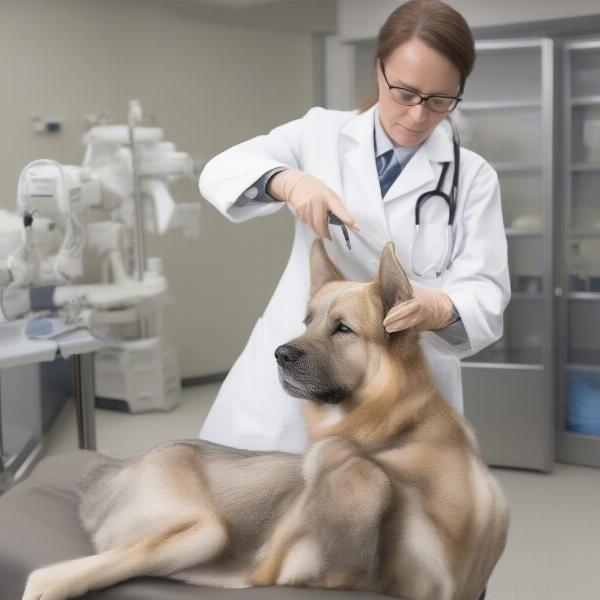Black spots on your dog’s fur can be alarming, but they aren’t always a cause for concern. Understanding the potential reasons behind these spots, from simple hyperpigmentation to more serious medical conditions, is key to ensuring your furry friend’s well-being. This article will delve into the various causes of black spots on dog fur and guide you on when it’s necessary to seek veterinary advice.
Common Causes of Black Spots on Dog Fur
Several factors can contribute to the appearance of black spots on your dog’s fur. Some are harmless and simply part of your dog’s natural pigmentation, while others may signal an underlying health issue.
Hyperpigmentation
Hyperpigmentation is a common cause of black spots, especially in older dogs. It’s a harmless increase in melanin, the pigment that gives skin and fur its color. These spots are usually flat and can appear anywhere on the body. Think of them like freckles or age spots in humans.
Allergies
Allergies, whether environmental or food-related, can cause inflammation and irritation of the skin. This can lead to itching, scratching, and ultimately, secondary infections. These infections can sometimes result in darkened or black spots on the skin and fur.
Insect Bites and Parasites
Fleas, ticks, and mites can cause skin irritation and inflammation, leading to black spots. These spots are often accompanied by intense itching and redness. Regular parasite prevention is crucial to avoid these issues. black dots on dogs fur can sometimes be a sign of flea dirt.
Infections
Bacterial and fungal infections can also manifest as black spots on the dog’s fur. These infections can vary in severity and may require veterinary treatment. Symptoms can include hair loss, redness, and a foul odor.
Post-Inflammatory Hyperpigmentation
After an injury or skin infection heals, the affected area can sometimes darken. This is known as post-inflammatory hyperpigmentation and is a common occurrence.
When to See a Vet
While many black spots are benign, it’s crucial to know when to seek professional advice. Consult your veterinarian if you notice any of the following:
- Rapid changes in the size, shape, or color of the spots
- Bleeding or oozing from the spots
- Hair loss around the spots
- Intense itching or discomfort
- Any signs of infection, such as redness, swelling, or a foul odor
Diagnosing and Treating Black Spots
Your veterinarian will perform a physical examination and may conduct further tests, such as skin scrapings or biopsies, to determine the cause of the black spots. tiny black spots on dogs skin may require closer examination. Treatment will depend on the underlying cause and may involve medications, topical treatments, or changes in diet.
 Veterinarian Examining Dog's Skin
Veterinarian Examining Dog's Skin
Preventing Black Spots
While not all black spots are preventable, maintaining good hygiene, providing a healthy diet, and implementing regular parasite prevention can significantly reduce the risk of certain skin issues. Regular grooming and checking your dog’s skin can also help detect any changes early on. If your dog is prone to allergies, working with your veterinarian to identify and manage triggers can minimize the chances of skin irritation and subsequent hyperpigmentation.
Conclusion
Black spots on your dog’s fur can be caused by a variety of factors, ranging from harmless hyperpigmentation to more serious medical conditions. By understanding the potential causes and knowing when to seek veterinary attention, you can ensure your furry companion stays healthy and comfortable. Regular check-ups and a proactive approach to your dog’s skin health are essential for early detection and treatment of any potential issues. black dots on dogs paws can also be a cause for concern, so it’s important to monitor these areas as well.
FAQ
-
Are black spots on dog fur always a sign of something serious? No, many black spots are benign, especially those caused by hyperpigmentation.
-
Can allergies cause black spots on dog fur? Yes, allergies can lead to skin irritation and secondary infections, which can result in darkened spots.
-
How can I prevent black spots on my dog’s fur? Regular hygiene, a healthy diet, parasite prevention, and managing allergies can help reduce the risk.
-
When should I take my dog to the vet for black spots? If you notice rapid changes, bleeding, hair loss, intense itching, or signs of infection, consult your veterinarian.
-
What tests might a vet perform to diagnose the cause of black spots? Skin scrapings, biopsies, and physical examinations are common diagnostic tools.
-
Can black spots on dog fur go away on their own? Some black spots, like those caused by post-inflammatory hyperpigmentation, may fade over time.
-
What are the treatment options for black spots on dog fur? Treatment varies depending on the cause and may include medications, topical treatments, or dietary changes.
ILM Dog is a leading international website dedicated to providing expert advice on dog care and wellbeing. From breed selection and health care to training and nutrition, we offer a comprehensive resource for dog owners worldwide. ILM Dog understands the unique bond you share with your canine companion and provides practical tips and insights to ensure a happy and healthy life together. For personalized advice on dog care, including skin health, contact us at [email protected] or call us at +44 20-3965-8624.